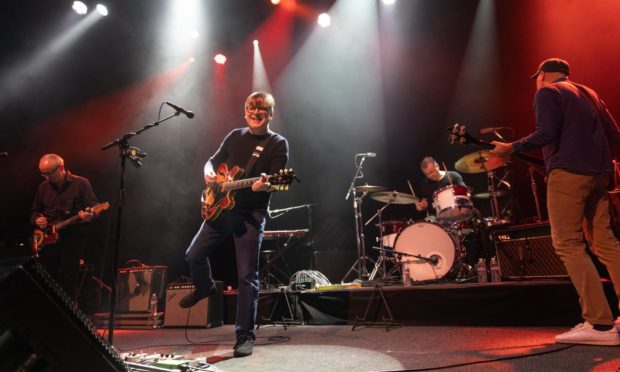There are very few moments in life where you can genuinely say you were one person before and a different one after, but such was the case when, at 16, I first heard Everything Flows by Teenage Fanclub.
It was an autumn afternoon in 1990 when a friend called me round to his house and, with a serious look on his face – for this was a serious business – pressed play on a creaking cassette. The song that emerged was… well, it was hopelessly muddy, the vocals half-submerged in the mix, the rhythm guitars chugging along like a slow avalanche of porridge, but above it all rang a keening riff – a single, bent guitar note that played continuously for five minutes and did something funny to my insides and my brain. I didn’t understand what I was hearing, but knew I needed to, and would.
Thus began my three-decade passion for what all proper music lovers know is the finest British band since the Beatles, and the greatest Scottish band of all. Teenage Fanclub, of wee Bellshill, went on to achieve worldwide reverence, leaving behind them a long, harmony-soaked tail of perfect, aching, pop songs.
Don’t just take it from me. Kurt Cobain called them “the best band in the world”, while to Liam Gallagher they were “the second best band in the world” (no prizes for guessing who was first). Dave Grohl says he wished he could write songs as good as theirs. They could have been much, much bigger were it not for an engrained Scottish insouciance – what Alan McGee, a mentor and boss of the Creation record label, described as their “streak of self-sabotage”. They simply wouldn’t play the corporate game.
We are the same as we were at 16 – just with the edges knocked off
I look back to that day in 1990 and it feels like yesterday. But in fact we are as distant from it as I was then from 1959, a year in which Frankie Valli, the Everly Brothers and Elvis dominated the charts and a teenage band called Johnny and the Moondogs, featuring three young men called Lennon, McCartney and Harrison, were auditioning for TV Star Search at the Empire Theatre in Liverpool.
We have wrinkled together, Teenage Fanclub and I. In a couple of weeks the band release their 11th album, Endless Arcade, already the subject of superlative reviews. They, like me, are greyer, a bit more lined and careworn and beaten up by life. Their songs, once spunky, punky free-for-alls, are now more likely to be gentle, folk-tinged laments about the passage of time, about broken relationships and the toll of caring. If this makes them sound dull, they’re anything but. The spectacular harmonies and chiming guitars remain, but in place of a cocky, Monkees-style gang spirit there is wisdom, lambency, a measuring of fate.
As we age there are things we take with us that make the journey tolerable and help us make sense of it
There is comfort in this. As we age there are things we take with us that make the journey tolerable and help us make sense of it – friends and family, the annual rebirth of nature, the sublimity of great music, certain novels whose pleasures evolve as you reread, religion for some, the importance and richness of enduring love. You will have your own historical support structure – and I suspect, despite what your children or grandchildren might think, you regard yourself as much the same person you were at 16, just with the edges knocked off.
Fragments of memory suspended in time
Increasingly, in my mid-40s, I find events that seemed to have happened five minutes ago are long in the past – it’s possible to think in decades rather than years. As Norman Blake, Teenage Fanclub’s greatest songwriter, puts it in Slow Fade: “Slow fade, pictures in my mind/ Fragments of memory suspended in time/ The colours seep away and the lines disappear”.
And as it becomes, in the words of the novelist Martin Amis, “time to stop saying hi and start saying bye”, this measuring of things matters all the more. Opportunities taken and missed, bad choices that nevertheless form the bedrock of who we become, the lows that ultimately reveal a tensile, undefeatable strength. Over the past, troubled year especially, age and experience has armed us with the vital qualities of perspective and durability. The long game has its advantages.
That’s what Teenage Fanclub mean to me today. The value of great art, of music, literature and poetry, is that it contains and shapes one’s past, provides inspiration and uplift in the present, and illuminates the path ahead. We walk this endless arcade together, on a journey that must end, and as we make our way shout: “We were here!” into echoing time.
Chris Deerin is a leading journalist and commentator who heads independent, non-party think tank Reform Scotland

